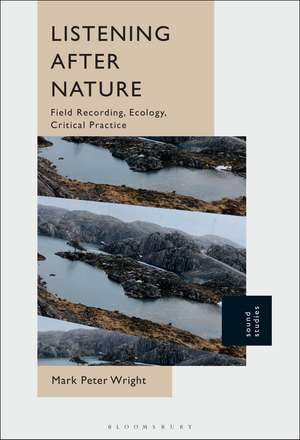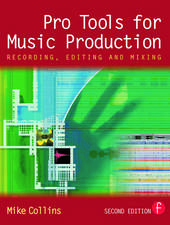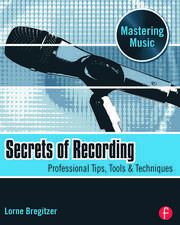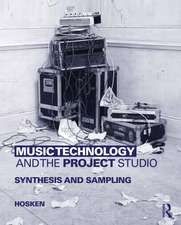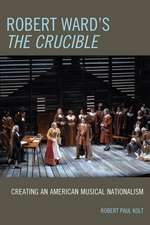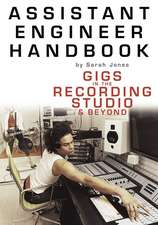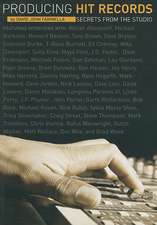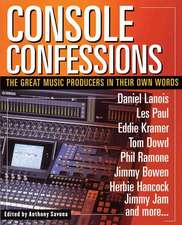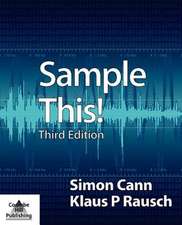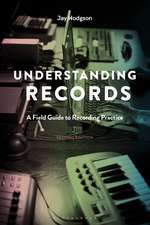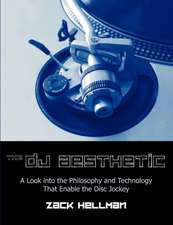Listening After Nature: Field Recording, Ecology, Critical Practice
Autor Dr. Mark Peter Wrighten Limba Engleză Paperback – 27 dec 2023
| Toate formatele și edițiile | Preț | Express |
|---|---|---|
| Paperback (1) | 190.96 lei 6-8 săpt. | |
| Bloomsbury Publishing – 27 dec 2023 | 190.96 lei 6-8 săpt. | |
| Hardback (1) | 509.76 lei 6-8 săpt. | |
| Bloomsbury Publishing – iun 2022 | 509.76 lei 6-8 săpt. |
Preț: 190.96 lei
Preț vechi: 249.15 lei
-23% Nou
Puncte Express: 286
Preț estimativ în valută:
36.56€ • 38.14$ • 30.64£
36.56€ • 38.14$ • 30.64£
Carte tipărită la comandă
Livrare economică 13-27 martie
Preluare comenzi: 021 569.72.76
Specificații
ISBN-13: 9781501392863
ISBN-10: 1501392867
Pagini: 222
Dimensiuni: 152 x 229 x 25 mm
Greutate: 0.32 kg
Editura: Bloomsbury Publishing
Colecția Bloomsbury Academic
Locul publicării:New York, United States
ISBN-10: 1501392867
Pagini: 222
Dimensiuni: 152 x 229 x 25 mm
Greutate: 0.32 kg
Editura: Bloomsbury Publishing
Colecția Bloomsbury Academic
Locul publicării:New York, United States
Caracteristici
A much needed discussion of environmental sound art practice in relation to contemporary ecological debate.
Notă biografică
Mark Peter Wright is an artist, researcher, and member of CRiSAP (Creative Research into Sound Arts Practice), University of the Arts, London. His practice intersects sound arts, ecology, and experimental pedagogy across exhibition, performance, and publishing.
Cuprins
Acknowledgments Introduction 1. Recoding the Field2. Constructing Nature3. Stretching Site4. Following the FlowConclusion: Pressing Record & Pressing Play-On Suspicious Listening & Affirmative EthicsBibliographyIndex
Recenzii
A comprehensive and thought-provoking book, it brings together popular, new and possibly radical ideas for readers to consider. Wright is another brilliant example of a practising artist whose passionate interest and work thoroughly informs a clever, heartfelt book."
Although it is debatable exactly how restorative sound recordings can be in the context of a dying world, Listening After Nature does suggest that a more responsible approach is overdue if we wish to retain a field of any description. The book is a fine attempt at reassembling the existing cultural frameworks embedded in the niche but loaded genre of field recording.
A critical reflection, a critical introspection on the practice of field recording, summarized in this one sentence that turns up throughout the whole book: "What are we not hearing?"
I have been waiting for this book. Listening After Nature is a much-needed corrective to the practice and theory of field recording. Mark Peter Wright offers a critical reflexive account that troubles many of the field's assumptions, such as the sonic absence of the recorder, the search for sounds of nature without human presence and the transparency of the microphone. Emphasizing the impossibility of sustaining such an approach in a time "after nature," the book holds open the question of "what is a field recording," asking what is not heard as much as what is and providing playful and serious possibilities for "listening-with" practices adequate to a time of climate change and mass extinction.
Through the low frequencies of history, geography and experimental sonic practices, Listening After Nature lures us to critical audition. In the sonic contact zones of shrimps and stars, foley and documentary, signal and voice, this book shows us how listening is a position of power, and equally, of immense responsibility. It is crucial reading for students and scholars of sound arts, environmental humanities and media philosophy.
Imagine a dinner party with a majority of so-called field recordists. All of them talking about signal-to-noise ratios, recording techniques, latest microphones or the great time they spent going on expeditions to Asia, Africa, South America or somewhere else where ice caps are melting. To record, mind you, not to fill their cocktails, although the idea of ´extraction´ might apply to both. Mark Peter Wright's scholarship is a sort of a much-needed killjoy in what has been a celebratory run for a practice born out of unduly historical and disciplinary privilege(s) that naturalized unproductive oppositions between man, nature, science and ideology. The author reminds us of the ethical responsibilities when/in/while recording the field as the dawn chorus does not always start in the west, distant or as an other.
Although it is debatable exactly how restorative sound recordings can be in the context of a dying world, Listening After Nature does suggest that a more responsible approach is overdue if we wish to retain a field of any description. The book is a fine attempt at reassembling the existing cultural frameworks embedded in the niche but loaded genre of field recording.
A critical reflection, a critical introspection on the practice of field recording, summarized in this one sentence that turns up throughout the whole book: "What are we not hearing?"
I have been waiting for this book. Listening After Nature is a much-needed corrective to the practice and theory of field recording. Mark Peter Wright offers a critical reflexive account that troubles many of the field's assumptions, such as the sonic absence of the recorder, the search for sounds of nature without human presence and the transparency of the microphone. Emphasizing the impossibility of sustaining such an approach in a time "after nature," the book holds open the question of "what is a field recording," asking what is not heard as much as what is and providing playful and serious possibilities for "listening-with" practices adequate to a time of climate change and mass extinction.
Through the low frequencies of history, geography and experimental sonic practices, Listening After Nature lures us to critical audition. In the sonic contact zones of shrimps and stars, foley and documentary, signal and voice, this book shows us how listening is a position of power, and equally, of immense responsibility. It is crucial reading for students and scholars of sound arts, environmental humanities and media philosophy.
Imagine a dinner party with a majority of so-called field recordists. All of them talking about signal-to-noise ratios, recording techniques, latest microphones or the great time they spent going on expeditions to Asia, Africa, South America or somewhere else where ice caps are melting. To record, mind you, not to fill their cocktails, although the idea of ´extraction´ might apply to both. Mark Peter Wright's scholarship is a sort of a much-needed killjoy in what has been a celebratory run for a practice born out of unduly historical and disciplinary privilege(s) that naturalized unproductive oppositions between man, nature, science and ideology. The author reminds us of the ethical responsibilities when/in/while recording the field as the dawn chorus does not always start in the west, distant or as an other.
